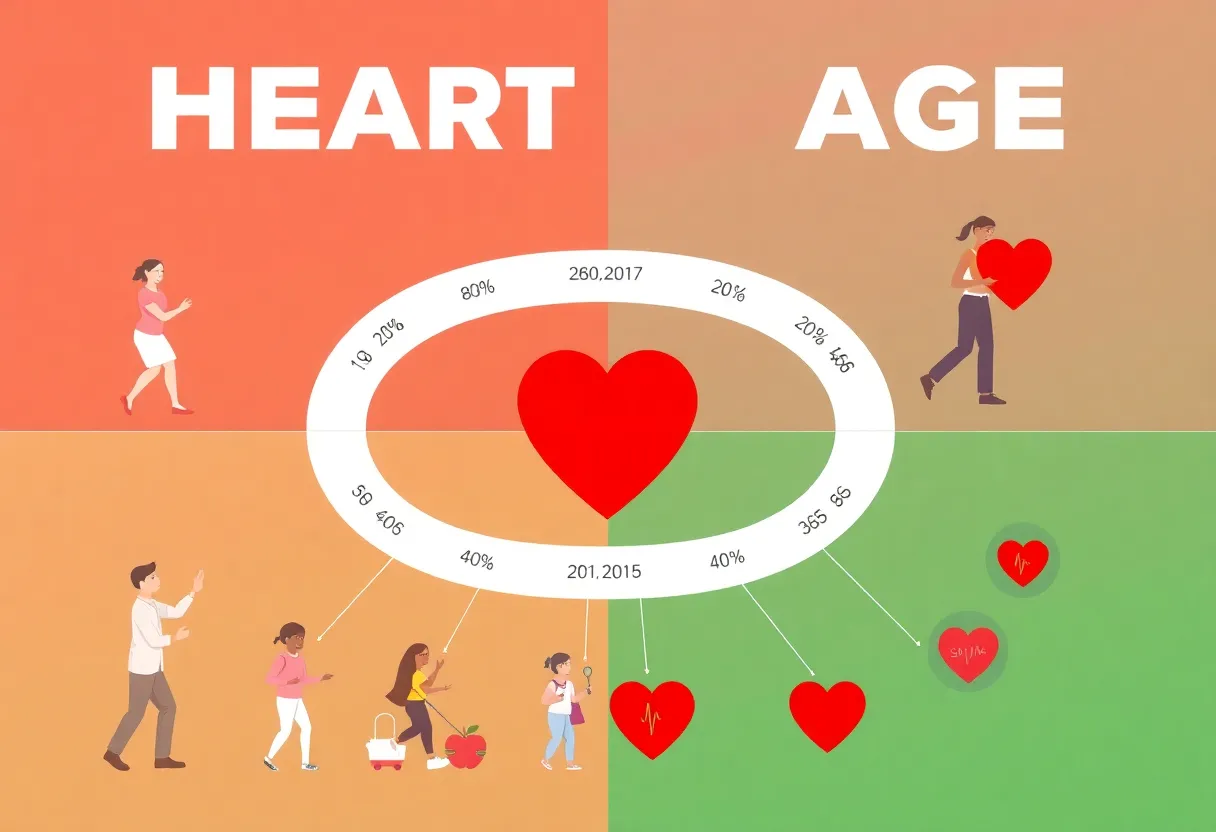News Summary
A study by Northwestern Medicine highlights alarming heart age disparities among U.S. adults, revealing many have a heart age significantly older than their actual age. The research shows that socioeconomic factors and race are linked to a higher heart age. A new online tool enables users to calculate their heart age, aiming to improve understanding of cardiovascular risks. This finding underscores the importance of awareness and proactive health management to combat heart disease, a leading cause of death in the U.S.
Chicago, IL – A recent study by Northwestern Medicine has revealed that a significant number of adults in the United States have a “heart age” that is considerably older than their actual age, with some discrepancies reaching over ten years. This finding highlights a pressing health concern, especially among certain demographic groups, including men, individuals with lower socioeconomic status, and those identifying as Black or Hispanic.
The study, which analyzed data from over 14,000 U.S. adults aged 30 to 79 who participated in the National Health and Nutrition Examination Survey from 2011 to 2020, found that the average heart age differs markedly from chronological age. For example, women’s average heart age is 55.4 years compared to their actual average age of 51.3 years, while men have an average heart age of 56.7 years, significantly older than their chronological age of 49.7 years.
Crucially, the research indicates that approximately one-third of men with only a high school education or less exhibit a heart age that is more than ten years older than their actual age. The disparities are even more pronounced for racial and ethnic minorities; Black men show an average heart age 8.5 years older than their chronological age, while Black women average 6.2 years older. Hispanic men average 7.9 years older, and Hispanic women have a gap of 4.8 years compared to their actual ages.
The Northwestern study has introduced a free online tool allowing users to calculate their heart age based on various cardiovascular disease risk factors, including blood pressure, cholesterol levels, smoking habits, and diabetes status. This innovative tool reframes traditional heart disease risk, typically conveyed as a percentage, into an age format that is easier for the public to understand and relate to.
It is important to note that the heart age calculator is intended as a supplementary resource and does not replace professional medical advice. Doctors and patients are encouraged to use this tool in conjunction with regular healthcare consultations to ensure comprehensive cardiovascular care.
The implications of this research are significant, as heart disease continues to be the leading cause of death in the United States, despite advancements in public health. Many adults remain unaware of their risk, underscoring the potential benefits of the heart age calculator in promoting better patient-doctor dialogue about heart disease risks and preventive strategies.
The study will be officially published in JAMA Cardiology on July 30, 2025, and is titled “PREVENT Risk Age Equations and Population Distribution in US Adults.” The authors are hopeful that this new approach to presenting cardiovascular risk will enhance understanding and compliance with preventive health measures among patients.
Future research will delve into whether this method of communicating risk—by presenting it as heart age—actually leads to better medical outcomes and enhances the understanding of preventive therapies. The study’s lead author emphasizes the urgent need for increasing awareness about heart disease, particularly among younger individuals, to inspire proactive health management and lifestyle changes.
As the heart age tool gains visibility, it is expected to facilitate more productive discussions around heart disease and encourage individuals to take charge of their cardiovascular health.
Deeper Dive: News & Info About This Topic
HERE Resources
Concerns Over Drinking Habits and Health Risks
Construction Worker Dies in Trench Collapse in Maryland
Calls for National Mesothelioma Registry Gain Support from Legal Advocates
New Jersey Woman Hospitalized Due to Turmeric Supplement Overdose
Additional Resources
- The Washington Post: Heart Biological Age and Cardiovascular Disease
- STAT: Most Americans’ Hearts Older than Chronological Age
- Medical Xpress: Adults’ Hearts Older than Actual Age
- Today: Heart Age Study and Calculator
- BuzzFeed: Heart Cardiovascular Age
- Wikipedia: Heart Disease
- Google Search: Cardiovascular Disease
- Google Scholar: Heart Age Calculator
- Encyclopedia Britannica: Heart
- Google News: Heart Disease
Author: STAFF HERE INDIANAPOLIS WRITER
The INDIANAPOLIS STAFF WRITER represents the experienced team at HEREIndianapolis.com, your go-to source for actionable local news and information in Indianapolis, Marion County, and beyond. Specializing in "news you can use," we cover essential topics like product reviews for personal and business needs, local business directories, politics, real estate trends, neighborhood insights, and state news affecting the area—with deep expertise drawn from years of dedicated reporting and strong community input, including local press releases and business updates. We deliver top reporting on high-value events such as the Indianapolis 500, Indy Jazz Fest, and the Indiana State Fair. Our coverage extends to key organizations like the Indy Chamber and Visit Indy, plus leading businesses in motorsports and healthcare that power the local economy such as Indianapolis Motor Speedway and IU Health. As part of the broader HERE network, we provide comprehensive, credible insights into Indiana's dynamic landscape.





